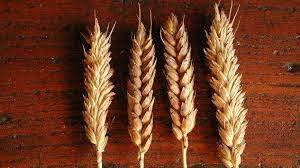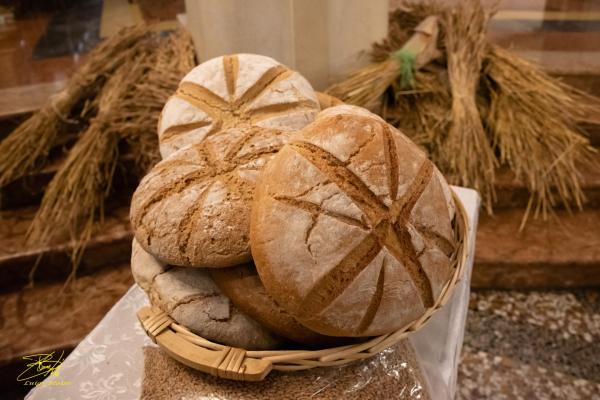Pa.N.E. - Panem Nostrum Everyday - Feeding Terdona

The project is based on an innovative strategic orientation aimed at readdressing the relationships between the agricultural world and consumers. This objective is achieved with an innovative supply chain aimed at overcoming specific problems of the current cultivation of modern wheat (excessive consumption of herbicides, increase in glutin content, excessive exploitation of the soil). The enhancement of the brand value is a key factor of this project by combining tradition (the recovery of a traditional wheat) with innovation (a new system of labeling agricultural products).
The project activities aim at: 1. spreading the use of the San Pastore wheat with the research of new production lines and the chemical-physical / analytical characterization of wheat, flour and derived products, ensuring the relative traceability; 2 adapting innovation through appropriate productive investments (nitrogen conservation center, social mill, energy production center and social agricultural bakery); 3. implementing a process of territorial integration with the creation of an Experimental Center of Tortona entitled at the "Epiousion. Urban Center Agro - Multifunctional food ".
The cereal sector in the Province of Alessandria, similarly to other areas of the Piedmont Region, presents some critical issues represented by the fragmentation and small size of businesses, a poor organization of the supply chain, several difficulties in innovation transfer, aging of the entrepreneurial sector and vulnerability to the crisis. Globalization and the integration of international markets have introduced a higher volatility in the prices of basic raw materials, such as to create imbalances within the local agri-food chain and cause a severe increase in production costs. The position of farmers is weak in relation with the the constant decrease of added value compared to the processes of transformation and distribution. For these processes, there is a strong level of power concentration. This aspect is particularly significant for companies producing "commodity" goods that must undertake a provision diversification. The project called Pa.N.E. Panem Nostrum Everyday provides a compelling alternative for territorial integration among the actors of the cereal supply chain, with the aim of redesigning the relationship between the farmer and the consumer, through the valorization of a variety of traditional Italian wheat (the Grano San Pastore). The project aims to create a territorial alliance for technology transfer to activate a repositioning process of farm industry with respect to the 1st and 2nd level transformers and the large-scale retailers with the aims of enhancing farm firms’ profits .
Product innovation consists of the following operational actions: 1) the promotion of ‘San Pastore’ wheat from a state of pure conservation to the marketing activities. Such a development path is achieved by identifying potential uses of the product in the second level of transformation activity, as well as in relation to the enhancement of the nutritional characteristics of the product; 2) the adoption of new lines of the S. Pastore variety with potential applications in the agricultural activity (i.e. sewing in the hills, deterrents for specific animal species) through the implementation of an appropriate codification system of the new lines. This new lines will also adopted in studying innovative approaches for the wheat conservation and milling, also in order to rediscovery ancient traditions in the production of products (described in sheet I2); 3) the application of chemical, biomedical, nutritional and traceability systems for wheat, flour and products, in order to guarantee the origin and the production processes of products such as "Grosso di Tortona" bread.
The process innovation focuses on the creation of the following operative units: 1. Nitrogen conservation center. The use of this technology in the cereal sector is innovative and effective in relation to recent studies conducted by the University of Florence and Bologna. This application allows maintaining the purity status of raw materials, avoiding the use of chemicals in the conservation stage. 2. Agricultural Social Mill. The use of modern technologies is based on combining the technology of milling with a 130 cm Italian stone in shades with the most modern cleaning, transport and packaging technologies in steel, without flanges and with nitrogen welding, for pneumatic transport and bagging. 3. Social Bakery. The most modern technology will be adopted to simplify production processes, even in the presence of traditional artisanal techniques in bread making. In order to carry out the previous described analysis (please see section I1), an oven will be used. This oven will also be adopted in the training activities to promote social inclusion paths for people in difficult conditions (in relation to this this aspect, please see section I3).
The social innovation focuses on the idea of redesigning the development opportunity for the Municipality of Tortona, in relation with a strategic territorial plan addressed at the creation of the Tortona Experimental Center entitled "Epiousion. Urban Center Agro - Multifunctional food ". The basic concept is to create a Smart Village in line with the principles of food culture, hospitality, social innovation and sharing economy. The center will be a rural hub allowing entrepreneurs to invest in the local area. The basic principle is to combine the rediscovery of the local traditions with the results of technological innovation processes developed in the University Research Centres. The aim is to start a new season of cultural growth for the territory, creating a place dedicated to present and taste local excellent food in accordance with the Italian principle of ‘chilometro giusto’. This place will represent the scientific research activity with a designed area, and the place for public engagment and dissemination, with an event programme promoting food culture and healthy aging. Social innovation will be expressed by using wheat and flours with the following purposes: 1. to become aware of the origin of food and alternative consumption patterns for healthy aging; 2. identify alternative purchasing models with local benefits and in accordance with a ‘chilometro giusto’ policy in the agricultural supply chain; 3. to support networking processes through the creation of a new place for meeting and cultural initiatives between city and countryside.
| Titolo/Descrizione | Url | Tipologia |
|---|---|---|
|
Sito web del progetto
|
Sito web
|
|
|
Pa.N.E. - Panem Nostrum Everyday - Nutrire Terdona
|
Link ad altri siti che ospitano informazioni del progetto
|
|
|
Pa.N.E. Comune di Tortona
|
Link ad altri siti che ospitano informazioni del progetto
|
|
|
Progetto Panem Nostrum Everyday - Nutrire Terdona
|
Link ad altri siti che ospitano informazioni del progetto
|
|
|
Elilu
|
Link ad altri siti che ospitano informazioni del progetto
|
|
|
Partner
|
Link ad altri siti che ospitano informazioni del progetto
|
|
|
Video - Il Pane Grosso di Tortona - Alla Fiera del Gas 2/10
|
Materiali utili
|
|
|
Pagina Facebook del progetto
|
Link ad altri siti che ospitano informazioni del progetto
|
|
|
Video su Linea Verde Rai 1
|
Materiali utili
|

Pa.N.E.-PANEM NOSTRUM EVERYDAY: FILIERA INNOVATIVA PER LA PRODUZIONE DI PANE
L'innovazione implementata si può descrivere in:
Innovazione di prodotto.
Se parliamo di pane, parliamo di farina, di produzione di cereali e di modalità…